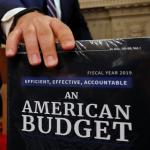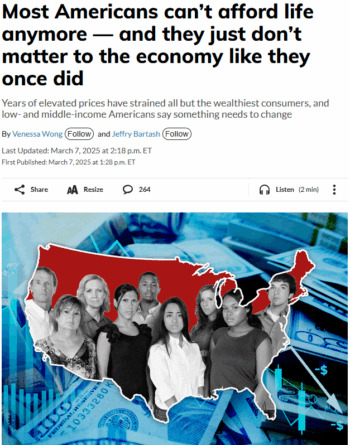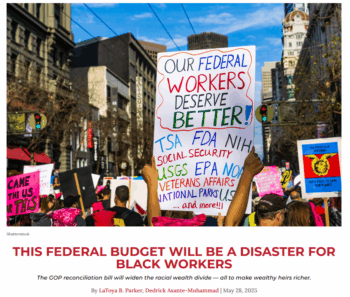‘This Isn’t Just About Policy, It’s About What Kind of Nation We Want To Be’: CounterSpin Interview With LaToya Parker on Trump Budget’s Racial Impact

Janine Jackson: “Most Americans Can’t Afford Life Anymore” is the matter-of-fact headline over a story on Dow Jones MarketWatch. You might think that’s a “stop the presses” story, but apparently, for corporate news, it’s just one item among others these days.
The lived reality is, of course, not just a nightmare, but a crime, perpetrated by the most powerful and wealthy on the rest of us. As we marshal a response, it’s important to see the ways that we are not all suffering in the same ways, that anti-Black racism in this country’s decision-making is not a bug, but a feature, and not reducible to anything else. What’s more, efforts to reduce or dissolve racial inequities, to set them aside just for the moment, really just wind up erasing them.
So how do we shape a resistance to this massive transfer of wealth, while acknowledging that it takes intentionality for all of us to truly benefit?
LaToya Parker is a senior researcher at the Joint Center for Political and Economic Studies, and co-author, with Joint Center president Dedrick Asante-Muhammad, of the recent piece “This Federal Budget Will Be a Disaster for Black Workers.” She joins us now by phone from Virginia. Welcome to CounterSpin, LaToya Parker.

LaToya Parker: Thank you so much for having me.
JJ: I just heard Tavis Smiley, with the relevant reference to Martin Luther King, saying: “Budgets are moral documents.” Budgets can harm or heal materially, and they also send a message about priorities: what matters, who matters. When you and Dedrick Asante-Muhammad looked at the Trump budget bill that the House passed, you wrote that, “racially, the impact is stark”—for Black people and for Black workers in particular. I know that it’s more than one thing, but tell us what you are looking to lift up for people that they might not see.

OtherWords (5/28/25)
LP: Sure. Thank you so much for raising that. This bill is more than numbers. It’s a moral document, like you mentioned, that reveals our nation’s priorities. What stands out is a reverse wealth transfer. The ultra-wealthy get billions in tax breaks, while Black families lose the very programs that have historically provided pathways to the middle class.
JJ: You just said “historic pathways.” You can’t do economics without history. So wealth, home ownership—just static reporting doesn’t explain, really, that you can’t start people in a hole and then say, “Well, now the Earth is flat. So what’s wrong with you?” What are some of those programs that you’re talking about that would be impacted?
LP: For instance, nearly one-third of Black Americans rely on Medicaid. These cuts will limit access to vital care, including maternal health, elder care and mental health services.
Nearly 25% of Black households depend on SNAP, compared to under 8% of white households. SNAP cuts will hit Black families hardest, worsening food insecurities.
But in terms of federal workforce attacks, Black Americans are overrepresented in the public sector, 18.7% of the federal workforce, and over a third in the South. So massive agency cuts threaten thousands of stable, middle-class jobs, undermining one of the most successful civil rights victories in American history.

LaToya Parker: “The ultra-wealthy get billions in tax breaks, while Black families lose the very programs that have historically provided pathways to the middle class.”
So if I was to focus on the reverse wealth transfer, as we clearly lift up in the article, the House-passed reconciliation bill is a massive transfer of wealth from working families to the ultra-wealthy. It eliminates the estate tax, which currently only applies to estates worth more than $13.99 million per person, or nearly $28 million per couple. That’s just 1% of estates. So 99.9% of families, especially Black families, will never benefit from this.
Black families hold less than 5% of the US wealth, despite being over 13% of households. The median white household has 10 times the wealth of the median Black household. Repealing the estate tax subsidizes dynastic wealth for the majority white top 1%, and does nothing for the vast majority of Black families, who are far less likely to inherit significant wealth.
JJ: I feel like that wealth disconnection, and I’ve spoken with Dedrick Asante-Muhammad about this in the past, there’s a misunderstanding or just an erasure of history in the conversation about wealth, and Why don’t Black families have wealth? Why can’t they just give their kids enough money to go to school? And it sounds like it’s about Black families not valuing savings or something. But of course, we have a history of white-supremacist discrimination in lending and loaning and home ownership, and in all kinds of things that lead us to this situation that we’re in today. And you can’t move forward without recognizing that.
LP: Absolutely. Absolutely.
JJ: I remember reading a story years ago that said, “Here’s the best workplaces for women.” And it was kind of like, “Well, if you hate discrimination, these companies are good.” Reporting, I think, can make it seem as though folks are just sitting around thinking, “Well, what job should I get? Where should I get a job?” As though we were just equally situated economic actors.
But that doesn’t look anything like life. We are not consumers of employment. Media could do a different job of helping people understand the way things work.
LP: Absolutely. And I think that’s why it’s so important that you’re raising this issue. In fact, we bring it up in our article, in terms of cuts to the federal workforce and benefits. So, for instance, to pay for these tax breaks to the wealthy, the bill slashes benefits for federal employees, and it guts civil service protections, saving just $5 billion a year in the bill that costs trillions, right?
So just thinking about that, Black employees make up, like I said before, 18.7% of the federal workforce, thanks to decades of civil rights progress and anti-discrimination law. Federal jobs have long provided higher wages, stronger benefits and greater job security for Black workers than much of the private sector.
And the DMV alone, the DC/Maryland/Virginia region, more than 450,000 federal workers are employed, with Black workers making up over a quarter in DC/Maryland/Virginia. In the South, well over a third of the federal workers in states like Mississippi, Alabama, South Carolina and Louisiana are Black. In Georgia, it’s nearly 44%. So federal employment has been a cornerstone for Black middle-class advancement, helping families build generational wealth, send children to college and retire with dignity.
JJ: And so when we hear calls about, “Let’s thin out the federal government, because these are all bureaucrats who are making more money than they should,” it lands different when you understand that so many Black people found advancement, found opportunity through the federal government when they were being denied it at every other point. And it only came from explicit policies, anti-discriminatory policies, that opened up federal employment, that’s been so meaningful.
LP: Exactly. Exactly. Federal retirement benefits like the pensions and annuities are a rare source of guaranteed income. Nearly half of Black families have zero retirement savings, making these benefits critical to avoiding poverty in retirement. So these policies amount to a reverse wealth transfer, enriching wealthy heirs while undermining the public servants and systems that have historically offered a path forward for Black workers. Instead of gutting the benefits and eliminating the estate tax, we should invest in systems that have provided pathways to the middle class for Black workers, and expand these opportunities beyond government employment. Ultimately, this isn’t just about policy, it’s about what kind of nation we want to be, right? So that’s what it’s all about.
JJ: And I’ll just add to that with a final note. Of course, I’m a media critic, but I think lots of folks could understand why I reacted to this line from this MarketWatch piece that said, “Years of elevated prices have strained all but the wealthiest consumers, and low- and middle-income Americans say something needs to change.” Well, for me, I’m hearing that, and I’m like, “So it’s only low- and middle-income people, it’s only the people at the sharp end, who want anything to change.”
And, first of all, we’re supposed to see that as a fair fight, the vast majority of people against the wealthiest. But also, it makes it seem like such a zero-sum game, as though there isn’t any shared idea among a lot of people who want racial and economic equity in this country. It sells it to people as like, “Oh, well, we could make life livable for poor people or for Black people, but you, reader, are going to have to give something up.” It’s such a small, mean version of what I believe a lot of folks have in their hearts, in terms of a vision going forward in this country. And that’s just my gripe.
LP: I agree. These aren’t luxury programs. They’re lifelines across the board for all Americans. The working poor—if you like to call it that, some like to call it that—cutting them is just cruel, right? It’s economically destructive, it’s irresponsible. Fiscally, states would lose $1.1 trillion over 10 years, risking over a million jobs in healthcare and food industries alone. So I agree 100%.
JJ: All right, we’ll end on that note for now. We’ve been speaking with LaToya Parker, senior researcher at the Joint Center. They’re online at JointCenter.org, and you can find her piece, with Joint Center president Dedrick Asante-Muhammad, on the impact of the federal budget on Black workers at OtherWords.org. Thank you so much, LaToya Parker, for joining us this week on CounterSpin.
LP: Thank you again for having me.
LaToya Parker is a senior researcher at the Joint Center for Political and Economic Studies, and co-author, with Joint Center president Dedrick Asante-Muhammad, of the recent piece “This Federal Budget Will Be a Disaster for Black Workers.”
Janine Jackson is FAIR’s program director and and producer/host of FAIR’s syndicated weekly radio show CounterSpin. She contributes frequently to FAIR’s newsletter Extra! and co-edited The FAIR Reader: An Extra! Review of Press and Politics in the ’90s (Westview Press). She has appeared on ABC‘s Nightline and CNN Headline News, among other outlets, and has testified to the Senate Communications Subcommittee on budget reauthorization for the Corporation for Public Broadcasting. Her articles have appeared in various publications, including In These Times and the UAW’s Solidarity, and in books including Civil Rights Since 1787 (New York University Press) and Stop the Next War Now: Effective Responses to Violence and Terrorism (New World Library). Jackson is a graduate of Sarah Lawrence College and has an M.A. in sociology from the New School for Social Research.
FAIR, the national media watch group, has been offering well-documented criticism of media bias and censorship since 1986. We work to invigorate the First Amendment by advocating for greater diversity in the press and by scrutinizing media practices that marginalize public interest, minority and dissenting viewpoints. As an anti-censorship organization, we expose neglected news stories and defend working journalists when they are muzzled. As a progressive group, FAIR believes that structural reform is ultimately needed to break up the dominant media conglomerates, establish independent public broadcasting and promote strong non-profit sources of information.
